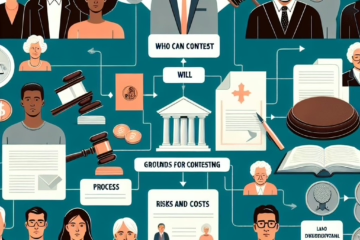Why We Need a Will in BC
Table of contents
- Protect Your Loved Ones
- What constitutes a legal will in BC?
- What happens if you pass away without leaving a will?
- Is there an upside to the unpleasantness and inconvenience for me?
- Do I need a lawyer or notary public to write a legal will?
- Why should I consider having a lawyer draft my will?
- What is probate in BC?
- Can my will be challenged and overturned?
Protect Your Loved Ones
Preparing your will is one of the most important things you will do during your lifetime, outlining your wishes in the event of your passing. It guides your family and loved ones in the handling of your estate and provides you with peace of mind that those you love are taken care of.
Having a will addresses all the important questions as a parent, like who will raise your young children if both you and your spouse die. Your will is also the best way to ensure that other people, charities and organizations you cherish receive the benefit of your estate. Surprisingly, many British Columbians have not taken care of preparing their last will and testament, even though it’s usually easier than they imagine.
According to a B.C. Notaries survey conducted in 2018, only 44% of British Columbians have a signed, legally valid and up-to-date will. 80% of persons between the ages of 18 and 34 do not have a valid will. To encourage the BC public to write their will, or bring an existing one up-to-date, the BC government initiated Make-a-Will-Week on October 3 to 9, 2021, to encourage them to get over feelings of discomfort or inconvenience.
What constitutes a legal will in BC?
Three requirements must be met for a will to be considered valid in British Columbia:
- It must be in writing;
- It must be signed at the end, and;
- It must be properly witnessed.
In March 2014, British Colombia created the Will, Estates and Succession Act, WESA, a new law governing wills and estates. One of the most significant changes introduced in the new law was something called a curative provision. Curative provision means that in cases where a will does not fully satisfy the formal requirements, the courts can now “cure” the deficiencies in the broken will and pronounce the will valid. WESA also grants the Supreme Court of BC permission to determine if an unfinished will can be valid.
As a resident of B.C., you must sign your will in accordance with the British Columbia Wills Act. The Wills Act stipulates that two witnesses must see your signature on the final page of your will. Your witnesses must sign the last page after you. Until quite recently, wet ink had to be used to sign the testament and a physical copy needs to be stored.
The pandemic prompted the province to change rules around signatures, so users can now have a virtual meeting with witnesses and sign their documents online. In August of 2020, new legislation was introduced to allow people who are in different locations to use technology to remotely witness a will, and as of December 1, 2021 changes also granted electronic wills the same recognition as physical wills. BC became the first jurisdiction in Canada to change its laws to allow online filing.
All formats of electronic are now acceptable, but British Columbians are strongly encouraged to save their wills in PDF format, to make the probate process as easy as possible for the executor.
What happens if you pass away without leaving a will?
If you die without a will in place the provincial government will consider you to have died intestate. If you die intestate, the courts will use the BC Wills, Estates and Succession Act to decide how to distribute your assets and settle your affairs. They will appoint an executor and guardians for any minor children. By choosing not to exercise your Canadian right to a will while you’re alive, you forfeit control over your wishes when you’re no longer here to protest.
According to the Wills, Estates and Succession Act, the order of distribution typically follows the following order:
- If you have a spouse but no children, your entire estate goes to your spouse.
- If you have a spouse and a child who also belongs to that spouse, your spouse will receive the first $300,000. The remainder is then divided equally between the spouse and children.
- If you have a spouse and children, and those children do not belong to your spouse, your spouse gets the first $150,000. The remainder is then divided equally between the spouse and your children.
- If you have no children or spouse, your estate is divided equally between your parents. If only one is alive, that parent gets your entire estate.
- If you have no surviving parents, your siblings will get your estate. If they’re not surviving either, their children (your nieces and nephews) each get their share.
It’s important to note that common-law spouses, significant others, other loved ones and even pets are not always automatically accounted for in the provincial laws. If you have some wishes that pertain to those you care deeply about, it’s important that making a will becomes a priority.
Is there an upside to the unpleasantness and inconvenience for me?
This is an aspect of writing a will that many people miss. It can indeed be sobering to set aside a few hours to accept one’s mortality and make estate plans accordingly. Writing a will is a very grown-up thing to do.
Most people describe a sense of relief and freedom after things left undone have finally been taken care of. It’s been compared with the relief that accompanies finally cleaning up and sorting through the garage or attic – after putting it off for years – or finally having much-needed dental work done. Knowing that loved ones and other matters will be handled properly can be freeing, and lifting that burden can create a new sense of purpose in life.
Do I need a lawyer or notary public to write a legal will?
The simple answer is no, you do not require a lawyer to create a simple will and write your legal enduring power of attorney or representative agreements online. Your will does not need to be notarized in BC for it to be legal. An affidavit of execution will have to be notarized. However, a notarized affidavit of execution is not required in BC if your will needs to go through probate.
What makes your will legal is not how you made it, but rather that you signed it properly and had it witnessed. There are fill-in-the-blank templates online you can use to create a quick will for under $100. British Columbia does not currently recognize holographic handwritten wills created without any mechanical devices or witnesses. If you handwrite your will in BC, you should follow the accepted process for having it properly witnessed, so it’s a legally binding document.
Why should I consider having a lawyer draft my will?
“A professionally planned estate can eliminate or reduce stress, taxes and conflict for loved ones. We know that a legally prepared will ensures that your wishes are carried out for the benefit of your family and the organizations you support.”
-Jennifer Chow, president, Canadian Bar Association, B.C. Branch
Here are a few examples of the complex situations that will likely require expert advice:
- If your custom clauses are not clearly drafted, it can result in your heir(s) spending more money and can also be the cause of undue stress.
- If you choose to write your will on a piece of paper, it’s easier for a member of your family or a friend to challenge it in court.
- If you don’t want your spouse(s) to receive any of your estate, you should seek advice from a will and estate lawyer because WESA includes them.
- If you wish to designate as your beneficiaries children or adults with special needs who require continuing financial support, a trust needs to be set up for this in your will.
- If you don’t want your children to be the main beneficiaries, but your grandchildren, for example, you will need to arrange a trust for them.
- If you want a minor to receive the remainder of the trust fund when they reach the age of 19, but you want someone other than the executor to manage this trust fund; or if you wish to designate how the monies should be used for the beneficiary’s benefit before the funds are released.
- If you want to donate to charity, it can be complicated to set it up, properly naming the organization and contacting them to make the arrangements. (In addition, you may want to guarantee that your estate receives a charitable tax return to lower the amount of taxes it must pay. Not all entities can issue tax receipts.)
- If you are in the middle of a divorce, or are struggling over child custody after the separation, it may affect your estate.
- If you own a property with a third party, as a tenant-in-common, the executor of your testament may run into complications passing down your share of the property, when your executor wants to sell it.
- If you have a recreational property, your estate will owe capital gains tax at your death.
- If you run your own company or you are a shareholder of a company, your will should contain an accurate expression of your desires for the company’s future.
- You want to choose who will take care of your pets or establish a pet fund in your will.
Both lawyers and notaries public can prepare wills in British Columbia. The reason why you should ask a lawyer to advise you is that they can not only provide you with legal counsel but also defend your estate in court.
A lawyer not only will provide you with legal guidance but they will ensure that your last desires are not modified. In the event that your spouse or your child pursues a will variation claim, an attorney will also support the executor you chose with this procedure.
Estate planning lawyers can also assist you with matters such as income tax, minor children in the event of your death before they reach adulthood, real estate and life insurance, second marriages (with or without children) and common-law relationships.
What is probate in BC?
Probate is the process of the BC courts formally accepting your will. Not all estates need to go through probate, and the policies of your bank or financial institution usually determine whether they require a grant of probate before releasing your assets. There are no probate fees in BC if your estate is under $25,000, and a flat fee for estates larger than $25,000.
Can my will be challenged and overturned?
When people prepare their wills in BC, most do not consider that their heirs, or other potential beneficiaries who believe they have legal grounds, could launch a legal battle to alter the terms in their favour. Unfortunately, contesting a will with a Notice of Objection is quite common.
Challenging the will can be done before or after the probate process has started. If no challenge is made, and the will appears to have been executed properly, it will usually be deemed valid by the court during the probate process. The proceedings will be halted, however, if anyone alleges one of the following:
- The will was improperly executed
- The testator did not have testamentary capacity
- Undue influence was exerted on the testator
- Variations to the will are required under British Columbia laws
- The language used in the will is not clear
Having your will prepared with the counsel of a will and estate lawyer can ensure that your will is not only valid but will also hold up to a challenge in court.
Resources
Legislation modernizes how wills are signed, witnessed
Wills, Estates and Succession Act – [SBC 2009] Chapter 13
Discover more from Pax Law Corporation
Subscribe to get the latest posts sent to your email.



0 Comments